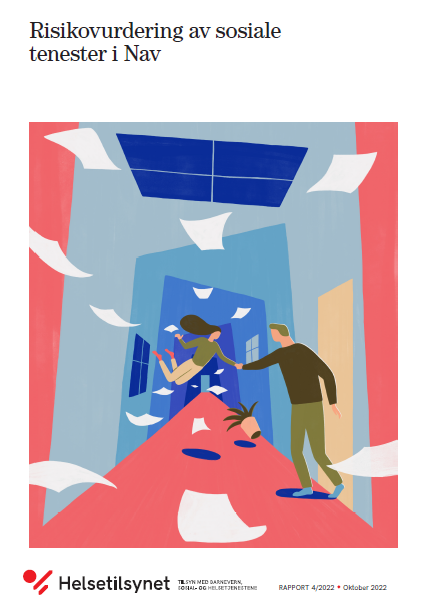Risk assessment of social services in Nav
Report by the Norwegian Board of Health Supervision 4/2022

Social services provided by Norwegian Labour and Welfare Administration (Nav) are the welfare society's last safety net. These services are intended to ensure that disadvantaged persons and families receive the assistance they need, such as information, advice and guidance, fnancial support and temporary housing provision.
Audit results and research from the last ten years show that users often receive inadequate levels of service. Those in need of social services often fnd themselves in vulnerable situations, and any failure of the safety net can have serious consequences.
In 2020-2021, the Norwegian Board of Health Supervision conducted a risk assessment of social services provided by Nav. The aim of this work was to identify areas where there is a risk of users and their families receiving inadequate levels of service. The Norwegian Board of Health Supervision will use the results of the risk assessment as a basis for identifying areas for auditing in the future, and has already begun using topics from the risk assessment in its nationwide audits in 2022-2023. The county governors must then carry out nationwide audits concerning the safeguarding of children's needs when parents contact social services.
The risk assessment involved the acquisition of knowledge concerning areas where failures in the social services can arise, followed by the preparation of a list of risk points based on this knowledge. This list formed the starting point for a national workshop with a panel representing the breadth of the feld, along with workshops held by each county governor.
The points that the expert panel and the county governors ranked as being most at risk are:
- Children's needs are not being adequately assessed.
- Children and young people are not receiving coordinated services.
- People's social situation and health situation are not being adequately assessed.
- Persons who are either experiencing or are at risk of experiencing social problems are not being ofered the ‘information, advice and guidance’ service.
The Norwegian Board of Health Supervision believes that the report is of relevance for municipal managements and Nav managers in their eforts to improve the practices of the Nav ofces. It is also relevant for the Labour and Welfare Directorate in its role as competent directorate regarding social services. In the report, we propose learning points for the municipalities and the Labour and Welfare Directorate concerning measures in areas where the results indicate that the risk of failure is greatest.